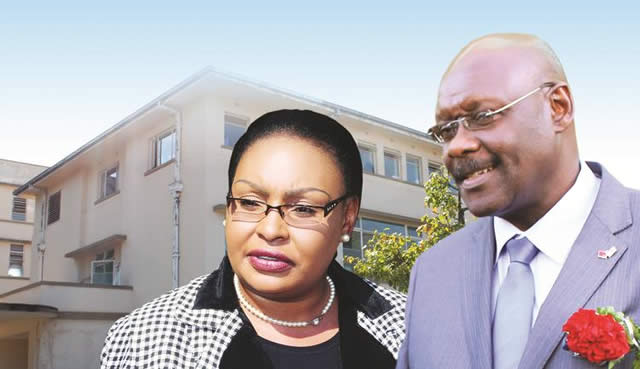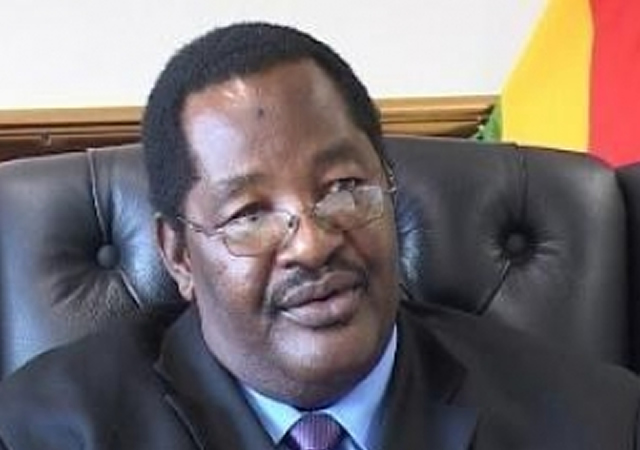EBOLA SCARE AT UBH -Zambia truck driver sparks panic -Minister announces taskforce


UBH Chief Executive Officer Nonhlanhla Ndlovu and Health and Child Care Minister Dr David Parirenyatwa
Auxilia Katongomara/Sifundiso Ndlovu Chronicle Reporters—
PANIC spread through a major Bulawayo hospital after a cross-border truck driver with symptoms of the deadly Ebola fever was admitted on Tuesday. The 52-year-old driver, thought to be Zambian, was in transit from South Africa to Zambia when he fell ill and was rushed to the United Bulawayo Hospitals, where he was reportedly put in isolation.
Hospital sources said the patient drives trucks across Central and Southern Africa, through countries that include the Democratic Republic of Congo, Botswana, South Africa and Zambia.
In the worst outbreak of the haemorrhagic Ebola fever on record, the disease has killed 1,426 of the 2,615 people who have contracted the virus in West Africa, mostly in Guinea, Sierra Leone and Liberia. It has also been detected in countries like the DRC, Nigeria and Senegal.
The truck driver was brought in “bleeding from the nose, shivering and vomiting blood,” said a nurse at the institution who cannot be named because she was not cleared to talk to the media.
Symptoms, which manifest between two to 21 days after infection, include fever, muscle pain, headache and a sore throat followed by vomiting, diarrhoea, rash, impaired kidney and liver function and in some cases both internal and external bleeding.
The nurse added: “He was immediately put in isolation and medical tests were conducted.”
Staff at the Bulawayo City Council-run Thorngrove Isolation Hospital said they were put on standby on Tuesday evening after being warned that a patient would be transferred if results proved it was Ebola. Late yesterday, officials at the hospital said they had not received the patient.
UBH Chief Executive Officer Nonhlanhla Ndlovu said: “There is no such case at UBH. We haven’t heard of any Ebola case.”
Yesterday, the government announced it had set up a national Ebola viral disease taskforce in an effort to contain the spread of the deadly pandemic.
Health and Child Care Minister Dr David Parirenyatwa told journalists that the taskforce is expected to evaluate the risk of an Ebola outbreak and advise the government on appropriate measures to mitigate the impact in the event of an outbreak.
He said the goal of the inter-ministerial taskforce comprising the Ministries of Health and Child Care, Transport and Infrastructural Development, Home Affairs and Tourism and Hospitality Industry was to support global efforts to contain the spread of the disease and provide a coordinated national and international response for the travel and tourism sector.
“The taskforce has been set up as part of strategies on Ebola alertness, preparedness and response,” Dr Parirenyatwa said.
“Though we don’t have Ebola in the country, we shall strategise ways to counter this deadly virus. Zimbabweans travel across the world and this is a critical area that needs to be addressed.”
Dr Parirenyatwa said it was important to have notices at airports that direct travellers from West Africa to certain points for screening.
On travel restrictions, Dr Parirenyatwa said it was difficult to implement it in Zimbabwe like what other countries like Zambia have done since the country had no direct flights from affected countries.
He also said that the taskforce will learn from the countries that had already been affected.
“We are privileged that the deadly virus did not start with us so the taskforce will learn from the countries already under attack,” said Dr Parirenyatwa.
He said isolation centres have been set up around the country with the support of the World Health Organisation (WHO) which provided protective clothing to use in case of an outbreak.
Ebola is a deadly and highly-contagious virus which was first reported in Zaire, now the Democratic Republic of Congo, in 1976.
About 90 percent of people who contract Ebola are killed by the disease.
The virus causes internal and external bleeding and damages the immune system and organs. The virus may be contracted through contact with blood or bodily fluids of the infected.










Comments